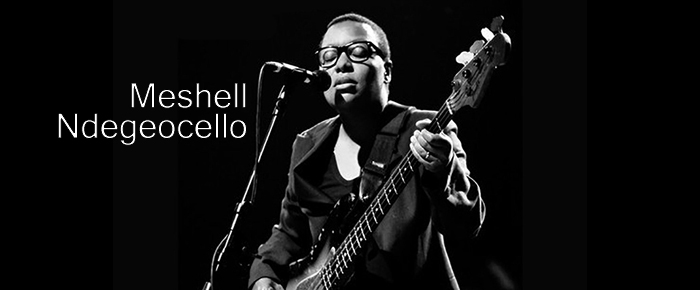
By Eleni P. Austin
Twenty years ago, Meshell Ndegeocello burst on the music scene with her incendiary single, “If That’s Your Boyfriend (He Wasn’t Last Night),” from her debut, Plantation Lullabyes. That album sparked the Neo-Soul movement of the early ‘90s.
Ndegeocello was born Michelle Lynn Johnson in Berlin, Germany. Her father, Jacques, was a career military man who played saxophone. Her mother, Helen, was a health care worker. Growing up in Washington, D.C., she attended Duke Ellington School Of The Arts.
At 17, she changed her last name to Ndegeocello, which is Swahili for “Free As A Bird.” Drawn to the vibrant Go-Go scene, she began playing bass with bands like Prophecy, Little Beenie & The Masters, and Rare Essence. She auditioned for Living Colour, intent on replacing departing bassist, Muzz Skillings. When that didn’t work out, she decided to go solo.
Ndegeocello was one of the first artists signed to Madonna’s boutique label, Maverick. Not unlike her hero, Prince, she played nearly all the instruments on Plantation Lullabyes. The album was a revelation, incorporating Jazz, Funk and Hip Hop. It was nominated for three Grammys, for Best R&B Album, R&B Song and R&B Female vocalist. (It also inspired future Neo-Soul superstars, D’Angelo, Erykah Badu, Maxwell, Jill Scott and Tony! Toni! Tone’!)
John Mellencamp was so impressed he invited Ndegeocello to duet on a rollicking version of Van Morrison’s “Wild Night.” The track was a huge hit, peaking at number three on the Billboard charts.
Ndegeocello’s sophomore effort, Peace Beyond Passion reflected her political beliefs. Openly bi-sexual, she rallied against intolerance on songs like “Deuteronomy: Niggerman” and “Leviticus: Faggot.” The melodies were steeped in Funk grooves, but the message was heavy-handed.
She was back on track by 1999 with her third album, Bitter. A deeply felt song cycle about a broken romance, the moods shifted from graceful to acrimonious to wistful all in the same song. The album rivaled k.d. lang’s Ingenue as the soundtrack for any listener wallowing in the mire of heartbreak, or experiencing the sting of unrequited love.
Ndegeocello carried on at a prodigious pace, releasing the ambitious Cookie: The Anthropological Mixtape, in 2002. The sultry Comfort Woman arrived in 2003. Two years later she included all-star Jazz players on Spirit Music Jamia, her vision of “spiritual groove music.”
By 2007, she had switched to the Decca record label, recording the experimental Jazz of The World Has Made Me The Man Of My Dreams. She followed up in 2009 with the restless Devil’s Halo. By the decade’s end, she got back to basics, enlisting singer-songwriter, Joe Henry to produce the stripped down Weather. She even took time to record Pour Une Ame Souverlaine: A Dedication To Nina Simone. It was a perfect fit, since the late great mercurial Jazz legend and Ndegeocello seemed like kindred spirits.
Comet, Come To Me is Ndegeocello’s 11th release. It opens with a cover of Whodini’s “Friends.” The trio, along with Afrika Bambaataa, Run D.M.C. and randmaster Flash And The Furious Five, were NYC Rap pioneers. Thirty years ago, the Whodini track was a straight ahead discourse on loyalty. In Ndegeocello’s hands the mood is jazzy and oblique.
Four songs, “Tom,” “Comet, Come To Me,” “Conviction” and “Folie A Deux” negotiate the delicate complications of (to paraphrase Gwenyth Paltrow), “conscious uncoupling.”
“Tom” is a slinky ‘70s throwback blending sweet soul guitar licks, a warm horn section and a kick-drum beat. A tart meditation on the shifting sands of attraction, Ndegeocello is blunt. “There is nothing between us except the feeling of nothing/The force that passes through our hearts, and the truth of knowing something’s wrong.”
The easy Skank of the title track belies Ndegeocello’s dry reportage. “Thought I’d make you happy, thought I’d make me happy too/So I never admitted these feelings, something in me has stopped pretending.” Sugar rush guitar riffs, layered piano and organ, plus a swoony violin and multi-tacked vocals almost cushion the blow.
“Conviction” is a Stones-y groover powered by a hand-clap rhythm, wah-wah guitars and “Philadelphia Freedom” styled strings. Here, Nedegeocello chastises a weak-willed friend for returning to a destructive relationship… “You choose delusion, so you can take him back.”
Finally on “Folie A Deux,” (French for “a madness shared by two”), Ndegeocello channels a classic Curtis Mayfield vibe as she extricates herself from a decaying relationship. A stop-start back beat wocka-wocka guitars and skeletal piano tones accentuate the brutal honesty of “We look good together, like shiny fool’s gold.”
Two tracks, “Forget My Name” and “Modern Time” lock into an irresistible Reggae riddim. The former blends gamboling bass lines, a rock steady beat, tinkling piano, Ska-accented horns and chicken-scratch guitar. The lyrics caution “beware of certainty and doubt.”
The latter mixes clickity guitars, swirly keys and a two-step rhythm, Ndegeocello hopes her children will know the complexity of life. “I want my sons to know sweet joy, I want my sons to know sorrow.”
Other interesting tracks include the breezy “Good Day Bad,” which is propelled by a percolating rhythm, Folk-flavored acoustic guitar, shimmery vocals and piquant banjo notes.
Both “Continuous Performance” and “Shopping For Jazz” traverse an angular sonic landscape, while “Choices,” which decries sensory overload, is awash in ambient synths.
The album closes with the gentle benediction of “American Rhapsody.” Over plangent guitar tones and a bleak melody, the lyrics offer a tone poem of cautious optimism… “A bona fide like will arrive at last.”
It’s comforting to know that Meshell Ndegeocello is still here, 20 years later: Navigating her own course, not tethered by the commercial vagaries of the recording industry, still following her muse, making amazing music, on her own terms.











































